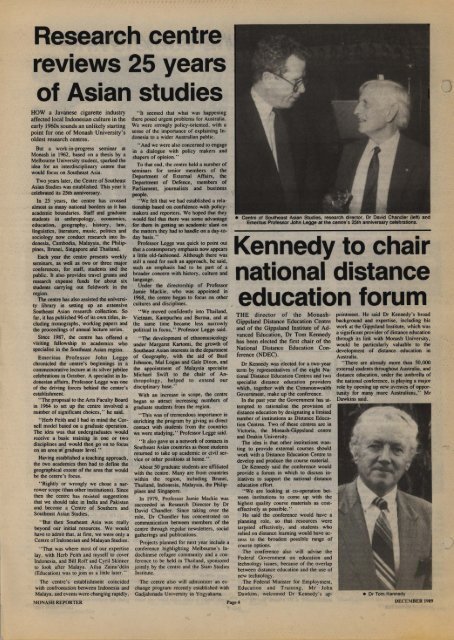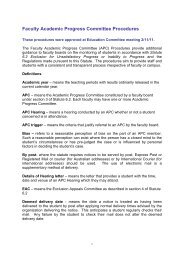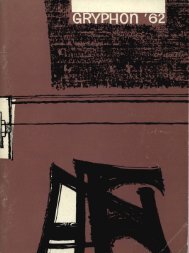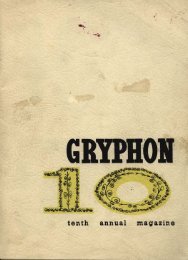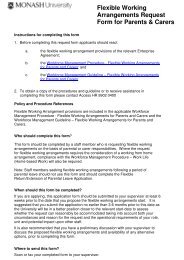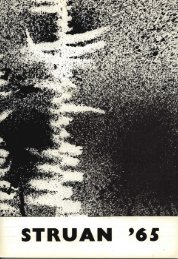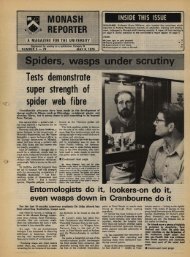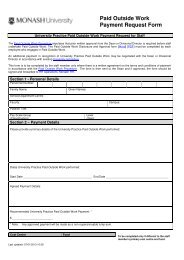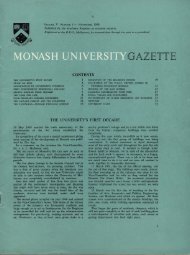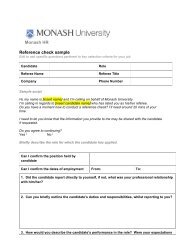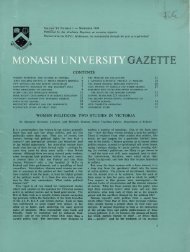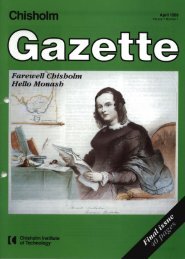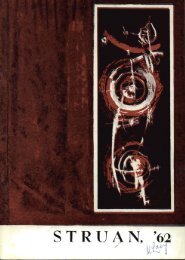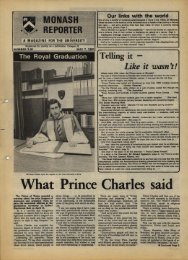Structure of the new university. begins to emerge - Adm.monash.edu ...
Structure of the new university. begins to emerge - Adm.monash.edu ...
Structure of the new university. begins to emerge - Adm.monash.edu ...
Create successful ePaper yourself
Turn your PDF publications into a flip-book with our unique Google optimized e-Paper software.
Research centre reviews 25 years <strong>of</strong> Asian studies HOW a Javanese cigarette industryaffected local Indonesian culture in <strong>the</strong>early 1%Os sounds an unlikely startingpoint for one <strong>of</strong> Monash University'soldest research centres.But a work-in-progress seminar atMonash in 1962, based on a <strong>the</strong>sis by aMelbourne University student, sparked <strong>the</strong>idea for an interdisciplinary centre thatwould focus on Sou<strong>the</strong>ast Asia.Two years later, <strong>the</strong> Centre <strong>of</strong> Sou<strong>the</strong>astAsian Studies was established. This year itcelebrated its 25th anniversary.In 2S years, <strong>the</strong> centre has crossedalmost as many national borders as it hasacademIc boundaries. Staff and graduatestudents in anthropology, economIcs,<strong>edu</strong>cation, geography. his<strong>to</strong>ry. law.linguistics. literature. music, politics andsociology now conduct research in<strong>to</strong> Indonesia,Cambodia, Malaysia, <strong>the</strong> Philip-pines, Brunei, Singapore arid Thailand.Each year <strong>the</strong> centre presents weeklyseminars, as well as two or three majorconferences, for staff. students and <strong>the</strong>public. It also provides travel grants andresearch expense funds for about sixstudents carrying out fieldwork in <strong>the</strong>region.The centre has .also assisted .tIC <strong>university</strong>library in setting up an extensiveSou<strong>the</strong>ast Asian research collection. S<strong>of</strong>ar. it has published 96 <strong>of</strong> its own titles, includingmonographs, working papers and<strong>the</strong> proceedings <strong>of</strong> annual lecture series.Since 1987, <strong>the</strong> centre has <strong>of</strong>fered avisiting fellowship <strong>to</strong> academics whospecialise in <strong>the</strong> Sou<strong>the</strong>ast Asian region.Emeritus Pr<strong>of</strong>essor John Leggechronicled <strong>the</strong> centre's beginnings in acommemorative lecture at its silver jubileecelebrations in Oc<strong>to</strong>ber. A specialist in Indonesianaffairs. Pr<strong>of</strong>essor Legge was one<strong>of</strong> <strong>the</strong> driving forces behind <strong>the</strong> centre'sestablishment."The proposal <strong>to</strong> <strong>the</strong> Arts Faculty Boardin 1964 <strong>to</strong> set up <strong>the</strong> centre involved anumber <strong>of</strong> significant choices," he said."Herb Feith and [ had in mind <strong>the</strong> Cornellmodel based on a graduate operation.The idea was that undergraduates wouldreceive a basic training in one or twodisciplines and would <strong>the</strong>n go on <strong>to</strong> focuson an area 'at graduate level."Having established a teaching approach.<strong>the</strong> two academics <strong>the</strong>n had <strong>to</strong> define <strong>the</strong>geographical extent <strong>of</strong> <strong>the</strong> area that wouldbe <strong>the</strong> centre's focus."Rightly or wrongly we chose a narrowerscope (than o<strong>the</strong>r institut<strong>to</strong>RS). Since<strong>the</strong>n <strong>the</strong> centre hb re~i~ted suggestionsthat we should take in India and Pakistanand become a Centre <strong>of</strong> Sou<strong>the</strong>rn andSou<strong>the</strong>ast Asian Studies.''But <strong>the</strong>n Sou<strong>the</strong>ast Asia was reallybeyond our initial resources. We wouldhave <strong>to</strong> admit that. at first, we were only aCentre <strong>of</strong> Indonesian and Malayan Studies.. 'That was where most <strong>of</strong> our expertiselay. with Herb Feith and myself <strong>to</strong> coverIndonesia. and Bill R<strong>of</strong>f and Cyril Skinner<strong>to</strong> look after Malaya. Ailsa Zainu'ddin(Education) was <strong>to</strong> join us a little later."The centre's establishment coincidedwith confrontation between Indonesia andMalaya. and events were changing rapidly.MONASH REPORTER.. It seemed that what was happening<strong>the</strong>re posed urgent problems for Australia.We were strongly policy-oriented. with asense <strong>of</strong> <strong>the</strong> imponance <strong>of</strong> explaining Indonesia<strong>to</strong> a wider Australian public."And we were also concerned <strong>to</strong> engagein a dialogue with policy makers andshapers <strong>of</strong> opinion .••To that end. <strong>the</strong> centre held a number <strong>of</strong>seminars for senior members <strong>of</strong> <strong>the</strong>Department <strong>of</strong> External Affairs, <strong>the</strong>Depanment <strong>of</strong> Defence. members <strong>of</strong>Parliament, journalists and businesspeople.'·We felt that we had established a relationshipbased on confidence with poIicymakersand reporters. We hoped that <strong>the</strong>ywould feel that <strong>the</strong>re was some advantagefor <strong>the</strong>m in gelling an academic slant on<strong>the</strong> matters <strong>the</strong>y had <strong>to</strong> handle on a day-<strong>to</strong>daybasis. "Pr<strong>of</strong>essor Legge was quick <strong>to</strong> point outthat a contemporary emphasis now appearsa little old-fashioned_ Although <strong>the</strong>re wasstill a need for such an approach, he said,su~h an emphasis had <strong>to</strong> be pan <strong>of</strong> abroader concern with his<strong>to</strong>ry, culture andlanguage.Under <strong>the</strong> direc<strong>to</strong>rship <strong>of</strong> Pr<strong>of</strong>essorJamie Mackie. who was appointed in1968. <strong>the</strong> centre began <strong>to</strong> focus on o<strong>the</strong>rcultures and disciplines."We moved confidently in<strong>to</strong> Thailand.Vietnam. Kampuchea and Burma. and at<strong>the</strong> same time became less narrowlypolitical in focus." Pr<strong>of</strong>essor Legge said."The development <strong>of</strong> ethnomusicologyunder Margaret Kar<strong>to</strong>mi, <strong>the</strong> growth <strong>of</strong>Sou<strong>the</strong>ast Asian interests in <strong>the</strong> department<strong>of</strong> Geography, with <strong>the</strong> aid <strong>of</strong> BasilJohnson, Mal Logan and Gale Dixon, and<strong>the</strong> appointment <strong>of</strong> Malaysia specialistMichael Swift <strong>to</strong> <strong>the</strong> chair <strong>of</strong> Anthropology,helped <strong>to</strong> extend ourdisciplinary base .••With an increase in scope, <strong>the</strong> centrebegan <strong>to</strong> attract increasing numbers <strong>of</strong>'graduate students from <strong>the</strong> region."This was <strong>of</strong> tremendous imponance inenriching <strong>the</strong> program by giving us directcontact with students from <strong>the</strong> countrieswe were studying." Pr<strong>of</strong>essor Legge said."It also gave us a network <strong>of</strong> contacts inSou<strong>the</strong>ast Asian countries as those studentsreturned <strong>to</strong> take up academic or civil serviceor o<strong>the</strong>r poSitions at home."About 50 graduate students are affiliatedwith <strong>the</strong> centre. Many are from countrieswithin <strong>the</strong> region. including Brunei,Thailand, Indonesia, Malaysia, <strong>the</strong> Philij>pinesand Singapore.In 1979, Pr<strong>of</strong>essor Jamie Mackie wassucceeded as Research Direc<strong>to</strong>r by DrDavid Chandler. Since taking over <strong>the</strong>role. Dr Chandler has concentrated oncommunication between members <strong>of</strong> <strong>the</strong>centre through regular <strong>new</strong>sletters. socialga<strong>the</strong>rings and publications.Projects planned for next year include aconference highlighting Melbourne's Indochineserefugee community and a conference<strong>to</strong> be held in Thailand. sponsoredjointly by <strong>the</strong> centre and <strong>the</strong> Siam StudiesInstitute .The centre also will administer an exchangeprogram recently established withGadjahmada University in Yogyakana.SolUlt_st AsIan Studies, research direc<strong>to</strong>r, Dr David Chandler (leftl andEmeritus Pr<strong>of</strong>essor John Legge at <strong>the</strong> centre's 25th anniversary _rations.Kennedy <strong>to</strong> chair national distance <strong>edu</strong>cation forum Page 4THE direc<strong>to</strong>r <strong>of</strong> <strong>the</strong> MonashGippsland Distance Education Centreand <strong>of</strong> <strong>the</strong> Gippsland Institute <strong>of</strong> AdvancedEducation, Dr Tom 'Kennedyhas been elected <strong>the</strong> first chair <strong>of</strong> <strong>the</strong>National Distance Education Conference(NDEC).Dr Kennedy was elected for a two-yearterm by representatives <strong>of</strong> <strong>the</strong> eight NationalDistance Education Cenlres and twospecialist distance <strong>edu</strong>cation providerswhich. <strong>to</strong>gelher with <strong>the</strong> CommonwealthGovernment. make up <strong>the</strong> conference.In <strong>the</strong> past year <strong>the</strong> Government has attempted<strong>to</strong> rationalise <strong>the</strong> provision <strong>of</strong>distance <strong>edu</strong>cation by designating a limitednumber <strong>of</strong> inslitutions as Distance EducationCentres. Two <strong>of</strong> <strong>the</strong>se centres are inVic<strong>to</strong>ria, <strong>the</strong> Monash-Gippsland centreand Deakin University.The idea is that o<strong>the</strong>r institutions wanting<strong>to</strong> provide external courses shouldwork with a Distance Education Centre <strong>to</strong>develop and produce <strong>the</strong> course material.Dr Kennedy said <strong>the</strong> conference wouldprovide a forum in which <strong>to</strong> discuss initiatives<strong>to</strong> support <strong>the</strong> national distance<strong>edu</strong>cation etlon."We are looking at co-operation betweeninstitutions <strong>to</strong> come up with <strong>the</strong>highest quality course materials as costeffectivelyas possible. "He said <strong>the</strong> conference would have aplanning role, so that resources weretargeted effectively. and students whorelied on distance learning would have access<strong>to</strong> <strong>the</strong> broadest possible range <strong>of</strong>course options .The conference also will advise <strong>the</strong>Federal Government on <strong>edu</strong>cation andtechnology issues. because <strong>of</strong> <strong>the</strong> overlapbetween distance <strong>edu</strong>cation and <strong>the</strong> use <strong>of</strong><strong>new</strong> technology.The Fedeml Minister for Employment.Education and Training. Mr JohnDawkins, welcomed Dr Kennedy 's ap-pointmenL He said Dr Kennedy's broadbackground and expenise, including hiswork at <strong>the</strong> Gippsland Institute, which wasa signifICant provider <strong>of</strong>distance <strong>edu</strong>calionthrough its link with Monash University.would he particularly valuable <strong>to</strong> <strong>the</strong>developme,nt <strong>of</strong> distance <strong>edu</strong>cation inAustralia."There are already more than 50,000external students throughout Australia. anddistance <strong>edu</strong>cation. under <strong>the</strong> umbrella <strong>of</strong><strong>the</strong> national conference. is playing a major---role by opening up <strong>new</strong> avenues <strong>of</strong> opportunityfor many more Australians." MrDawkins said,• Dr Tom KennedyDECDIBER t989)


